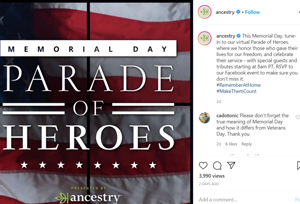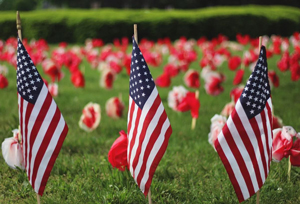NEW YORK—Memorial Day 2020 is shaping up to look pretty different from the unofficial start of summer that most of us are used to. This year, with social gatherings and interstate traveling off the table, most Americans will be unable to celebrate Memorial Day in the traditional ways—but that doesn’t mean we have to write the holiday off completely. In fact, there’s no better time than now to sit down and actually learn about the history of Memorial Day, and how it evolved into what we know now today.
Memorial Day began back in 1864, as a response to the extreme losses of the Civil War. Mental Floss reports that the holiday most likely began with women from Boalsburg, Pennsylvania, who put flowers out on the graves of fallen soldiers killed during the Battle of Gettysburg. Over the years, this practice grew and caught on in other states, and, then, in 1866 in Carbondale, Illinois, 219 Civil War veterans marched through town to the Woodlawn Cemetery to honor the fallen. There, Major General John A. Logan gave an address, and this is widely considered the first organized, community-wide Memorial Day service.
On May 5, 1868, General Logan issued General Order No. 11, which designated May 30, 1868 “for the purpose of strewing with flowers, or otherwise decorating the graves of comrades who died in defense of their country during the late rebellion,” Mental Floss reported. This sparked the beginning of Memorial Day as we know it—although Americans then called it Decoration Day, because they would go out to decorate the graves of fallen soldiers.

This year, many Memorial Day celebrations are moving online. Image via Ancestry on Instagram.
| | 
Memorial Day began with women decorating the graves of fallen Civil War soldiers. Image via Pixabay. |
For years, Decoration Day was celebrated on May 30—a day that General Logan reportedly chose because “it wasn’t the anniversary of any battle in particular,” Town & Country reports. It wasn’t until over 100 years later, in 1971, when the Uniform Monday Holiday Act took effect that the holiday was moved to the last Monday in May in order to ensure long weekends, according to Time Magazine.
Memorial Day was originally only intended to honor those soldiers who were killed during the Civil War, and it wasn’t until WWI that the holiday was extended to include all armed forces who had fallen in conflict, Town & Country said. Most surprisingly, Americans today are, actually, technically legally required to observe Memorial Day: according to Time, Congress passed a law in December 2000 that requires Americans to pause at 3:00 p.m. local time on Memorial Day to “remember and honor the fallen.”
This year may just mark another change in Memorial Day’s history: our first ever virtual Memorial Day. Instead of gathering for barbeques, parties at the beach, and moments of silence at the cemetery, Americans this year can log on and tune in to celebrate Memorial Day. This will be the first time in 31 years that PBS’ annual National Memorial Day Concert will be held virtually—and this year it will also honor those who are currently battling in the fight against COVID-19, Minnesota Monthly reports. The concert, hosted by Joe Mantegna and Gary Sinise, will stream live on PBS, PBS.org, YouTube, and Facebook at 8:00 p.m. Eastern on Monday.
In addition, Ancestry will be holding a virtual Memorial Day Parade of Heroes on Facebook, hosted by Kathie Lee Gifford. As part of the event, Ancestry is encouraging Americans to share a post on Instagram or Facebook using the hashtag #RememberAtHome and tagging Ancestry. The Vietnam Veterans Memorial Foundation will also host a live webcast of its annual ceremony, and many local veterans organizations around the country will do the same.
So, while this year’s Memorial Day might not be the sunny start to summer that most of us are used to, the restrictions placed on this year’s celebrations might just offer us the perfect chance to learn more about the holiday, what it means, and how we can change up our celebrations next year. And, no matter what happens, you can always eat a hot dog.